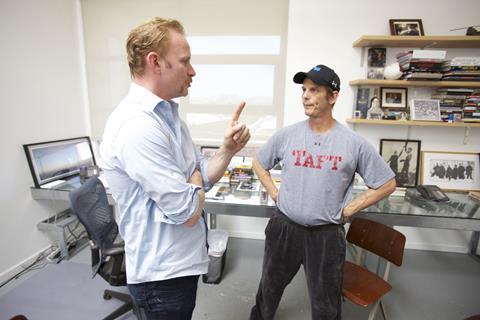Dir: Morgan Spurlock. US. 2011. 90mins

The Greatest Movie Ever Sold begins with truths that we already know – advertising is everywhere, independent films are harder to finance than ever and indie filmmakers will make sacrifices for funding. Would they even place products in a film for a fee?
Spurlock starts with the notion that any seller of a product needs to have exposure.
Morgan Spurlock paid for his whole third feature this way. Once again Spurlock is the narrator and the protagonist of a documentary, this one about how he convinced firms to place their products in a film made by the corporate critic who directed Super Size Me (2004).
Spurlock brings his own strong brand and a loyal audience to The Greatest Movie Ever Sold. Product placement hasn’t been the subject of an investigative documentary before, and the US public may be ready for a film about business that isn’t eyeing Wall Street misdeeds.
Since some of the many companies that placed products in the film are international brands, the punchy and revelatory film’s appeal could also be global.
Spurlock starts with the notion that any seller of a product needs to have exposure. Why not finance a film on that assumption?
Consultants tell Spurlock that his personal brand blends the “mindful” and the “playful,” and he sets out after likeminded firms, but only after he’s told that it’s impossible.
The idea is rejected by banks and breweries, retail chains, energy and car companies, and by Nike, all of which we watch as it happens, with Spurlock’s smartass narration and cinematography by Daniel Marracino that brings a new composure to Spurlock’s on-the-run style without losing the director’s contagious sense of fun.
And Spurlock finds brands, starting with Ban deodorant and then courting POM pomegranate juice, his lead sponsor. Merrell shoes, horse shampoo, Hyatt hotels, even the fast-food chain Sheetz climb on board. The band Ok Go writes a song for him.
Corporate culture tends to be more timidly cautious than bold, as Spurlock, his crew at the ready, tells firms how their products might look on the screen.
Ultimately Spurlock bonds with firms like himself, whose executives are good sports when mockery is part of a marketing strategy. After all, the key product on the screen here is Morgan Spurlock, with plenty of style and attitude. The products in the doc promote Spurlock as he promotes them.
The perception that Spurlock is selling out to advertisers (buying in, as it’s also called in the film) gets a serious debate in the doc from its critics, including Noam Chomsky and Ralph Nader. Spurlock stresses that he wasn’t told what to show, and that no firm placing product got to vet the film. He’s already chosen sides, making a next film on male grooming, with Jason Bateman, funded by product placements.
Other indie filmmakers are sure to besiege firms for products if Greatest Story succeeds. They’ll have to find another story to tell. The marketplace won’t want two docs about product placement.
Production companies: Warrior Poets,Snoot Entertainment
US Distributor: Sony Pictures Classics
International Sales: CAA
Producers: Jeremy Chilnick, Abby Hurewitz,Morgan Spurlock,Keith Calder,Jessica Wu
Co-Producer: Jonathan McHugh
Screenplay:Jeremy Chilnick,Morgan Spurlock
Cinematography: Daniel Marracino
Editors: Tom Vogt,Marrian Cho





















